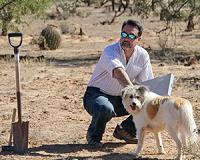 |
Leicester, UK (SPX) Apr 21, 2011 Medical researchers have held out promise that a simple injection is being developed to limit the devastating consequences of heart attacks and strokes. Described by the lead researcher as 'a fascinating new achievement', work has already begun to translate the research into novel clinical therapies. The University of Leicester led an international team whose research has been published in the Early Online Edition of the Proceedings of the National Academy of Sciences (PNAS). Professor Wilhelm Schwaeble of the Department of Infection, Immunity and Inflammation at the University of Leicester, initiated and co-ordinated research collaborations with King's College London, the Medical University of Fukushima, Japan and the State University of New York, to achieve the present breakthrough findings, which were published in PNAS. Professor Schwaeble and collaborators identified an enzyme, Mannan Binding Lectin-Associated Serine Protease-2 (MASP-2), that is found in blood and is a key component of the lectin pathway of complement activation, a component of the innate immune system. The lectin pathway is responsible for the potentially devastating inflammatory tissue response that can occur when any bodily tissue or organ is reconnected to blood supply following ischaemia - a temporary loss of that blood supply and the oxygen that it carries. This excessive inflammatory response is, in part, responsible for the morbidity and mortality associated with myocardial infarction (heart attack) and cerebrovascular accidents (CVAs or strokes). Moreover, the work succeeded in finding a way to neutralise this enzyme by raising a therapeutic antibody against it. A single antibody injection in animals has been shown to be sufficient to disrupt the molecular process that leads to tissue and organ destruction following ischaemic events, resulting in significantly less damage and markedly improved outcomes. "This is a fascinating new achievement in the search for novel treatments to significantly reduce the tissue damage and impaired organ function that occur following ischaemia in widespread and serious conditions such as heart attacks and strokes," said Professor Schwaeble. "This new potential therapy was also shown in animals to significantly improve outcomes of transplant surgery and may be applicable to any surgical procedure where tissue viability is at risk due to temporary interruption of blood flow. "The main focus of our work was to identify a key molecular mechanism responsible for the overshooting inflammatory response that can cause substantial destruction to tissues and organs following their temporary loss of blood supply, a pathophysiological phenomenon called ischaemia/reperfusion injury," added Professor Schwaeble. "Limiting this inflammatory response in oxygen-deprived tissues could dramatically improve outcomes and survival in patients suffering heart attacks or strokes." For more than seven years, the University of Leicester team has been working closely with a commercial partner, Omeros Corporation in Seattle (USA), to develop therapeutic antibodies for research and clinical applications. Omeros holds exclusive worldwide intellectual property rights to the MASP-2 protein, all therapeutic antibodies targeting MASP-2 and all methods for treating complement-mediated disorders by inhibiting MASP-2. The company has already begun manufacturing scale-up of an antibody for use in human clinical trials. Professor Schwaeble's team and Omeros are also working with Professor Nilesh Samani, the British Heart Foundation Professor of Cardiology and Head of the Department of Cardiovascular Sciences at the University of Leicester. It is anticipated that the first clinical trials evaluating Omeros' human antibody in myocardial infarction patients will be conducted in the Leicester Biomedical Research Unit , at Glenfield Hospital, Leicester. The development of this new technology was made possible through substantial and long-term grant support of the Wellcome Trust and the Medical Research Council, as well as through funding provided to Omeros Corporation by the U.S. National Institutes of Health.
Share This Article With Planet Earth
Related Links University of Leicester Hospital and Medical News at InternDaily.com
 Man's Best Friend: A Joint Tumour Marker In Man And Dog
Man's Best Friend: A Joint Tumour Marker In Man And DogVienna, Austria (SPX) Apr 21, 2011 The dog may be man's best friend but even so it comes as a surprise that the two species share a common tumour marker. This finding comes from a joint study between scientists of the Vetmeduni Vienna and the MedUni Wien, headed by Erika Jensen-Jarolim. The researchers looked for similarities in breast cancer of dogs and women, focussing on the tumour marker CEA (carcinoembryonic antigen). ... read more |
|
| The content herein, unless otherwise known to be public domain, are Copyright 1995-2010 - SpaceDaily. AFP and UPI Wire Stories are copyright Agence France-Presse and United Press International. ESA Portal Reports are copyright European Space Agency. All NASA sourced material is public domain. Additional copyrights may apply in whole or part to other bona fide parties. Advertising does not imply endorsement,agreement or approval of any opinions, statements or information provided by SpaceDaily on any Web page published or hosted by SpaceDaily. Privacy Statement |